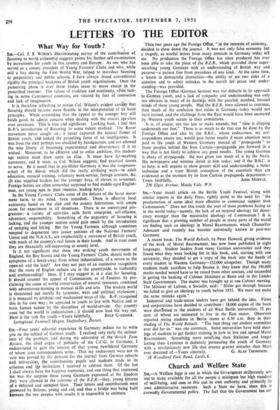Sia,—Four years' editorial experience in Germany induce me to write
you on the subject of German youth. I realised very early the serious- ness of the problem, and during my editorship of the-British Zone Review, the chief organ of publicity of the C.C.G. in Germany, I endeavoured to gain the interest of that young bewildered Germany of whom your correspondents write. That my endeavours were not in vain was proved by the demand for the journal from German schools and universities, the contributions pupils and students made to its columns and the invitations I received to address them. Of the last I shall always have the happiest memories, and one thing that impressed me was the surprise these young Germans expressed at the freedom they were allowed in the columns of the B.Z.R.—they, young Citizens of a defeated and occupied State. Then• letters and contributions were gn=ed by Britons, young and old, and thus a bridge was being built
n the two peoples with results it is impossible to estimate. Then two years ago the Foreign Office, " in the interests of economy, decided to close down the journal. It was not only false economy but a tragedy, as wistful letters from many contacts in Germany today tell me. No production the Foreign Office has since produced has ever been able to take the place of the B.Z.R., which provided those eager- searching young Germans with an understanding of British way and purpose—a picture free from prejudices of any kind. At the same time, a lesson in democratic journalism—the ability to see two sides of a question and to admit mistakes in the search for peace and under- standing—was provided.
The Foreign Office (German Section) was too didactic in its approach to Gerinan youth, and a lack of sympathy and understanding was only too obvious in many of its dealings with the puzzled, numbed, bruised minds of these young people. Had the B.Z.R. been allowed to continue, then much of the confusion that exists in Germany today would not have existed, and the challenge from the East would have been answered by Western youth secure in their convictions.
It is, of course, not too late to make amends, but " time is slipping underneath our feet." There is so much to do that can .be done by the Foreign Office and also by the B.B.C., whose endeavours, my cor- respondents assure me, would gain better results if more attention were paid to the youth of Western Germany instead of " propaganda r" to those peoples behind the Iron Curtain—propaganda put forward in a way that is not likely to achieve any great results. The young German is chary of propaganda. He was given too much of it by the Nazis. His newspapers and wireless shriek at him today, and if the B.B.C. is to help, it will require to show greater skill and understanding, a better technique and a truer British conception of the essentials than are evidenced at the moment by its Iron Curtain propaganda department.—
Yours faithfully, JOHN M OFFAT. 256 Elgin Avenue, Maida Vale, W.9.


































 Previous page
Previous page